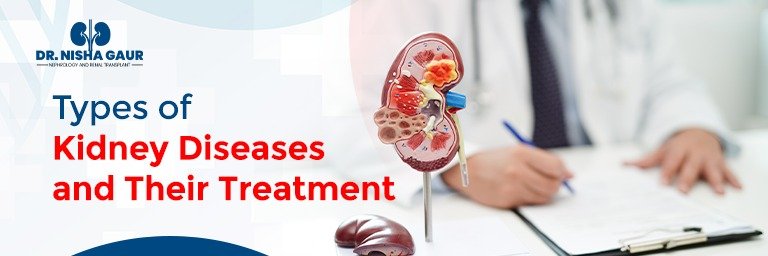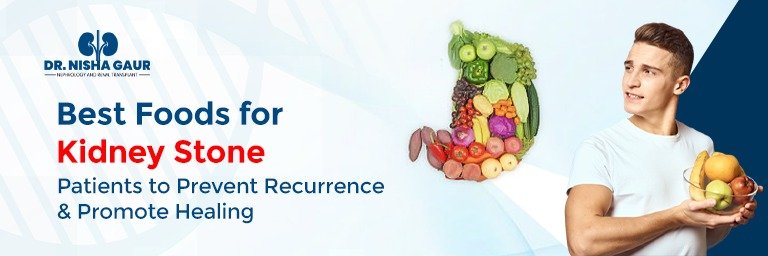Large numbers of people globally suffer from Chronic Kidney Disease (CKD). If your kidneys stop working as they should, you are said to have kidney disease. What you eat affects your approach to living with CKD. You can eat foods that can fight the disease and make you feel better. The chronic kidney disease diet chart contains useful guidance and several methods to support kidney health. It is also important to be aware of the Risk Factors that contribute to CKD and manage them effectively.
What Is Chronic Kidney Disease?
If there is a problem with kidney function, CKD appears. As a consequence, your body might keep more excess fluids and waste. There are many people with CKD as a result of high blood pressure and diabetes. Symptoms may not show up early on, yet later you might notice things like tiredness and swelling. If you are experiencing such symptoms, it may be time to consult a Nephrologist in Jaipur.
Why Diet Matters in Chronic Kidney Disease
For those with CKD, what you eat is very important. Minerals and fluids are balanced in your body partly due to your kidneys. Avoiding foods containing things that could damage your kidneys if they build up in the urine is necessary if you have trouble with your kidneys. Having a nutritious diet can protect your kidneys, bring down blood pressure and prevent additional kidney damage. Kidney Disease Care is essential to ensure that your dietary choices support your overall kidney health.
Chronic Kidney Disease Diet Chart
You can use this simple chronic kidney disease diet chart to choose your meals each day. A plan designed for your particular condition should be created by a dietitian or doctor.
| Food Group | Recommended | To Limit or Avoid |
| Proteins | Egg whites, chicken (skinless), fish | Red meats, processed meats |
| Fruits | Apples, grapes, berries, watermelon | Bananas, oranges, avocados |
| Vegetables | Cabbage, cauliflower, bell peppers | Tomatoes, potatoes, spinach |
| Grains | White rice, pasta, bread (low sodium) | Whole grains (high in phosphorus) |
| Dairy | Rice milk (low phosphorus/potassium) | Regular milk, yogurt, cheese |
| Beverages | Water, herbal tea (in moderation) | Cola, orange juice, energy drinks |
| Fats | Olive oil, unsalted butter in moderation | Margarine, fried foods, fast food |
Key Nutrients to Monitor in a CKD Diet
- If you eat a lot of salt, it can make blood pressure go up and harm your kidneys. Try to have meals with less sodium and skip putting salt when you cook at home.
- If potassium levels are high, the heart can become affected. Stay away from foods such as bananas, oranges and potatoes, since they can cause your potassium to rise.
- Increasing the risk of weak bones and heart problems is phosphorus. Try not to have dairy, nuts, seeds or colas often.
- Making your diet too high in protein may produce unnecessary stress on your kidneys. Make sure your protein meals are of good quality and don’t fill your plate with too much.
Foods to Avoid in a CKD Diet
- Snack foods (chips), soups that come in cans and frozen meals
- Food that is seasoned with salt (nuts, popcorn)
- Hot peppers and leafy greens contain the most potassium
- Cheese, ice cream and any sort of whole milk are part of the dairy group
- Dark-colored types of soda
- Eating fast food or meals you didn’t have to cook
Best Foods for a Kidney-Friendly Diet
- You find low potassium and high fiber in apples and berries
- Cabbage and bell peppers provide a lot of nutrients that are safe for your kidneys
- Egg whites are a good source of high-quality protein compared to phosphorus
- People with CKD can safely enjoy white rice and pasta as they help fill you up
- Without salt, popcorn and rice cakes are tasty and healthy if you keep your portion down
Tips for Meal Planning with CKD
- If you make your food ahead, you will find it easier to choose nutritious items when rushed
- Read the labels carefully so you end up with low-sodium and phosphate-free products
- Drink water regularly, but make sure you don’t consume so much that digesting and metabolizing becomes difficult
- Toss some basil, oregano, lemon juice and garlic into your dishes instead of adding salt
- Eat from smaller plates and weigh portions to help you keep the amount you eat in check
Supplements and Vitamins for CKD Patients
When their diet is restricted, CKD patients might need to use supplements. Even so, some vitamins are not always safe. Many people are advised to take the following supplements:
- Iron helps if you are anemic
- Vitamin D plays a role in maintaining bones
- Only use forms of calcium chalked by your doctor
- B Vitamins support your body’s energy production and metabolism
Always talk to your healthcare provider before starting any supplement.
Common Myths About CKD Diet
- Myth: You can’t eat any protein.
Fact: You can eat small amounts of high-quality protein. - Myth: All fruits and vegetables are healthy for CKD.
Fact: Some are too high in potassium and should be limited. - Myth: Drinking additional water will help remove toxins from your system.
Fact: If your kidneys have trouble coping with extra fluid, it can actually do your body harm. - Myth: Many believe you have to cut out flavor to be healthy.
Fact: With correct ingredients and methods, CKD meals are enjoyable.
Conclusion
When you have chronic kidney disease, your diet should be balanced. Using a good chronic kidney disease diet chart can rate your symptoms, delay disease progression and improve your general well-being. Making healthy food choices, limiting risky foods and getting advice from a healthcare worker can greatly help your condition. As we are all different, a dietitian or doctor can help you make a meal plan that works for you. Diet is critical to maintain if you have chronic kidney disease. Eating by a strong chronic kidney disease diet chart helps ease your symptoms, slow the disease and benefits your health. Healthy food choices, less of the bad foods and support from a healthcare provider can help you feel much better. Since each person is special, create a diet plan that’s personalized, always with the help of a qualified doctor or dietitian. For expert guidance, consult the best nephrologist in Jaipur, Dr. Nisha Gaur.
FAQs
1. What effect does eating dairy products have on persons living with CKD?
Ans. Don’t eat too much dairy, because many dairy products are rich in phosphorus and potassium.
2. Is eating eggs helpful for treating kidney disease?
Ans. If phosphorus is what you need to focus on, you can get lots of protein from egg whites.
3. What quantity of water should I consume day by day?
Ans. Try to stick to your doctor’s instructions, since some people with CKD might need to watch how much fluid they consume.
4. Can patients with CKD eat rice?
Ans. It’s true that white rice does not contain a lot of potassium or phosphorus.
5. How about using salt alternatives?
Ans. A lot of substitutes for salt are being used these days, but many of them include potassium which can be harmful. Getting medical advice is the first thing to do.



